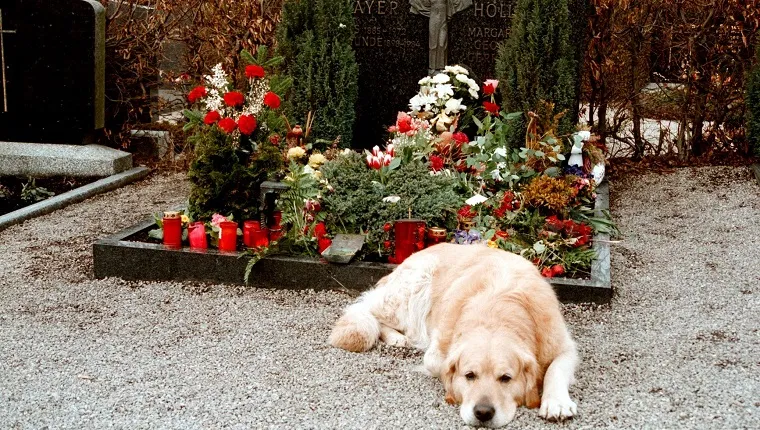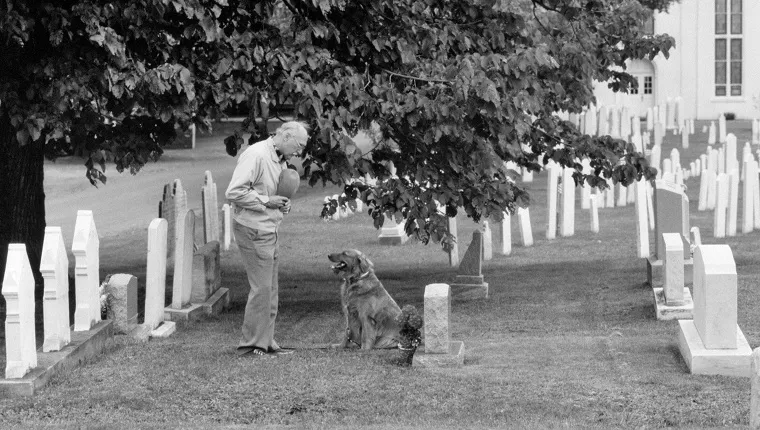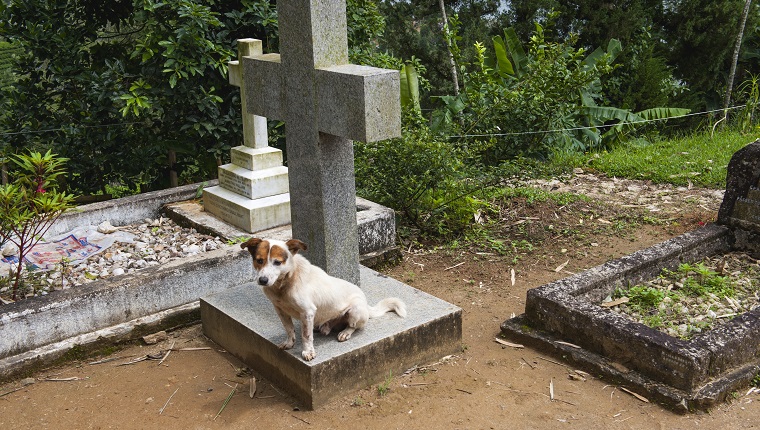A few years ago, a dog named Capitan passed away in Argentina at the age of 15 after spending eleven years waiting by his human’s grave every night.
Cemetery staff and neighbors always made sure he had food, and even when his family took him home, Capitan would end up back at the cemetery at the same grave each day at six o’clock where he would lie down all night.
Capitan’s story is touching, and it’s not the only story of dogs mourning the loss of their humans. Deta is another dog who refused to leave her former pet parent’s grave when her family took her to the cemetery, and the video of her running back to the site and lovingly lying down next to the tombstone is both heartwarming and heartbreaking.
Why do some dogs recognize their humans’ resting places, and why do they stay there? Do the dogs expect their pet parents to return? Are they waiting at the last spot they were able to smell their humans’ scents?
Can dogs understand death, and is there a spiritual component to their mourning?
Do Dogs Understand Death?
(Picture Credit: Getty Images)Research indicates that dogs are able to feel very deep connections to humans, and they experience many emotions similarly to the way we do.
As dog lovers, we already know that the love our dogs feel for us goes way beyond the need to have a food provider, and science backs up that claim.
In a study published in Behavioral Processes, researchers found that the part of dogs’ brains that light up when they detect their humans’ scents is the same part of the human brain that reacts to visual beauty and is associated with the early stages of being in love.
Additionally, Stanley Coren, a psychology professor at the University of British Columbia, says research shows that dogs have the mental capabilities of a two- to three-year-old human child. So clearly, dogs are able to feel the pain of loss very deeply, and they have some ability to mentally process and react to that loss.
However, whether they can understand the finality of death is not really clear when it comes to science.
Dogs can easily detect the scents of their humans. Furthermore, deceased human bodies emit many different chemicals that dogs can pick up with their noses, especially when the bodies are not embalmed.
Dogs can certainly smell and understand that there is a difference between a living body and one that is decomposing, but do they know that their human isn’t coming back to their body?
Do they know that death is irreversible?
Do Dogs Expect Their Dead Humans To Return?

There are several stories of dogs waiting for their humans to return, even after they’ve passed away.
One of the most famous is Hachiko, a dog in Japan who would wait every day at the train station for his human to return and continued to wait every day for ten years, even after his human passed away.
Stories of dogs waiting in vain for their humans have even made their way into pop culture, like a particularly notorious episode of the show Futurama, where a dog lives a long life waiting for his human to come back, but he never comes.
These dogs were waiting out of habit. They had learned where to expect their humans to be and waited at the last place they saw them.
Dogs who wait at their humans’ graves may be waiting at the last place they detected their humans by scent. In fact, they may be able to detect the scent of their humans’ bodies even after they are buried with their super noses.
Coren, the psychology professor, believes it is likely that dogs hold out hope that their humans will simply return — not as corpses, but as they always were in life. He says dogs don’t understand that death is final, and states, “I hate to say this – but in some respects they may have it better than we do, because at least they still have that glimmer of hope.”
Why Do Dogs Mourn?

If dogs can’t understand that death is final, why do they mourn? If they believe their humans can come back at any time, why do they seem to grieve so deeply?
Well, even if dogs can’t understand that death is final, they can certainly feel loss and have very extreme reactions to that loss. Anyone who has taken care of a dog as a pet sitter can tell you dogs go through a range of emotions and behaviors when their humans are no longer around.
Some dogs go on hunger strikes when their families leave for long periods of time. Some have anxiety attacks, some get physically sick, and some wait by the door at the same times every day expecting their humans to walk in like they always did.
Is that really any different than waiting by a grave where they know their human’s body lies buried?
Dogs aren’t just upset that the people who usually meet their basic needs by providing food, shelter, and safety are gone. If it were about basic needs, dogs would attach to anyone who cared for them as soon as their humans left the door and a new, capable caretaker arrived.
Eventually, they might grow to trust the new human and even love them, but there’s an adjustment period and a time of mourning. Dogs have a connection to their humans. It’s love, and when their humans leave, dogs get lovesick.
So even if a dog can’t understand that a person is gone forever, they can certainly understand that a person is gone.
Even though science can’t really tell us if dogs truly understand death yet, many of us have individual experiences and spiritual beliefs that influence the way we feel about dogs and their grief.
What About The Spiritual Side And Individual Experiences?

I had a Dachshund named Skippy. He was 16 years old when he came to live with my family, and he had already had two previous pet parents who passed away.
We got Skippy from his previous human just before she died of brain cancer, and her mother had Skippy before her. That previous pet parent told me a story that influenced my beliefs about dogs and their ability to understand death.
She said that, when her mother was on her death bed, Skippy was close by. At the exact moment that his human took her last breath, Skippy cried. It was a loud cry, and a sound that Skippy had never made before that moment and never made after.
She believed that Skippy detected her mother’s spirit leaving the body, and that Skippy knew her time had come.
Maybe that’s true.
Maybe dogs can tell when a spirit has left the body, and maybe dogs who wait at their humans’ graves are waiting for that spirit to return. And maybe they know that the end of life is not really the end.
I don’t personally believe in spirits or souls. I think dead is dead. However, I also don’t believe Skippy’s crying out was a coincidence. It seems to me that he could tell that there was a change, and that his human who was there one second was gone the next.
We Just Don’t Know For Sure
Ultimately, we don’t really have a way of knowing if dogs understand death or what they sense near their humans’ graves. We can’t just ask them, and it’s very difficult to come up with a reliable way to experiment and quantify their grief scientifically, much less comprehend how intricate it may be.
Maybe when we look at a mourning dog next to a tombstone, we’re projecting our own experiences of loss and misinterpreting what we see in dogs, or maybe we’re exactly right to think that they know all too well what’s going on, and that they’re experiencing the same pain we do when our hearts are broken.
Dogs can sense things that we can’t — we know that for sure. So maybe they know something that we don’t instead of the other way around.
What do you think? Do dogs understand death and mourn at their humans’ graves because of it? Are grieving dogs just waiting for their humans to return? Let us know in the comments below!
Related Articles:









